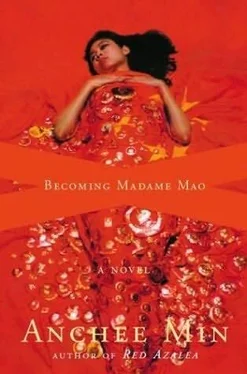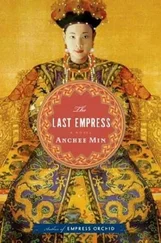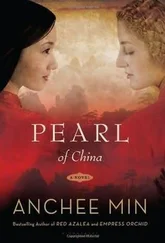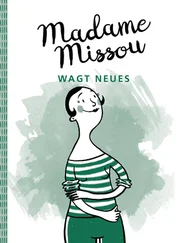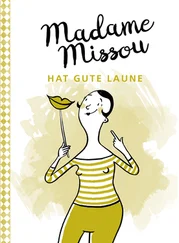Anchee Min - Becoming Madame Mao
Здесь есть возможность читать онлайн «Anchee Min - Becoming Madame Mao» весь текст электронной книги совершенно бесплатно (целиком полную версию без сокращений). В некоторых случаях можно слушать аудио, скачать через торрент в формате fb2 и присутствует краткое содержание. Жанр: Современная проза, на английском языке. Описание произведения, (предисловие) а так же отзывы посетителей доступны на портале библиотеки ЛибКат.
- Название:Becoming Madame Mao
- Автор:
- Жанр:
- Год:неизвестен
- ISBN:нет данных
- Рейтинг книги:4 / 5. Голосов: 1
-
Избранное:Добавить в избранное
- Отзывы:
-
Ваша оценка:
- 80
- 1
- 2
- 3
- 4
- 5
Becoming Madame Mao: краткое содержание, описание и аннотация
Предлагаем к чтению аннотацию, описание, краткое содержание или предисловие (зависит от того, что написал сам автор книги «Becoming Madame Mao»). Если вы не нашли необходимую информацию о книге — напишите в комментариях, мы постараемся отыскать её.
Becoming Madame Mao — читать онлайн бесплатно полную книгу (весь текст) целиком
Ниже представлен текст книги, разбитый по страницам. Система сохранения места последней прочитанной страницы, позволяет с удобством читать онлайн бесплатно книгу «Becoming Madame Mao», без необходимости каждый раз заново искать на чём Вы остановились. Поставьте закладку, и сможете в любой момент перейти на страницу, на которой закончили чтение.
Интервал:
Закладка:
It could be anywhere, on a chair, or on a sofa, on the floor, or by the window, in a hallway, or sometimes just standing in the middle of the room, as if we were on stage.
8
JULY 1937. A TRAIN WAILS through the night like an angry dragon. It heads toward Shanxi Province in the northwest of the country. This is guerrilla territory-the heartland of the Communist Party and its Red Army. Lan Ping is twenty-three years old. She rides the train. The track condition is poor. Outside the window the scene is desolate. There are no mountains, no rivers, no trees or crops. Barren hills extend mile after mile. The train has crossed the provinces of Jiangsu, Anhui and Henan.
An elderly man sitting next to Lan Ping asks if she had seen anything interesting. Without waiting for a reply he points out that they are passing through ancient battlefields. The sun is beginning to rise. Dark-skinned men and women are plowing in the fields. The women carry their infants on their backs. The man tells Lan Ping that in 1928 and 1929 three million people died of starvation in the area.
At first Yenan is a strange word to her. A place in the middle of nowhere. It is the opposite of Shanghai. Lan Ping feels like a blind woman in an alley-finding her way by touching walls. After Shanghai she tried other places. She tried the cities of Nanking, Wu Han and Chong-qin. She spoke to friends and acquaintances and asked for help and recommendations. Nothing worked. People had either never heard of her or they had heard too much. She knocked on doors, announced her name to strangers. She kept going, pushing herself, and kept a picture of hope in her head.
She began to hear more and more the name Mao Tse-tung. A guerrilla hero. A folk legend in the making. He represents the inland Chinese, the majority, the ninety-five percent of the peasants who are concerned about their homeland being taken over by the Japanese. There is no money for school, arts or entertainment, but the peasants send their sons to join the Red Army, to be Communists and be led by Mao Tse-tung.
She has the eyes of a pioneer. It is with this vision that she finds her next stage. Yenan is territory available for her to claim.
Before her departure she wrote an article which was published in the Shanghai Performing Arts Weekly. The title was "A View of Our Lives." In the article she criticized "pale art," the art that promotes bourgeois sentimentality. The plays in which women are praised for their sacrifices. The plays that embrace the foot-binding tradition. The art that turns a blind eye on the country's fatal condition. She called it "the selfish art." "To me art is a weapon. A weapon to fight injustice, Japanese, Imperialists and enemies alike."
"A View of Our Lives" was a loud cry. This performance, it was said, had legs and walked its way to Yenan, to Mao's cave, his bed.
The old truck she is on groans like a dying animal. Coated with red dust the girl from Shanghai is in good spirits. After three weeks on the journey she has just passed Xian, the gate of the red territory. They enter Luo-chuan, the last stop before Yenan.
August 1937. She has made friends with a woman named Xu who comes to join her husband Wang. Wang is the secretary of the Communist organization called United Front Against Japan's Invasion. He is here attending an important meeting.
That night Lan Ping and Xu stay in a peasant's cabin. Their beds are made of straw. They plan to fetch Wang the next day from the meeting and continue their journey together to Yenan. Lan Ping is tired and goes to bed early. She doesn't know that tomorrow morning will go down in history as an unsolved mystery of modern China.
At breakfast Xu tells Lan Ping that the place of her husband's meeting is a few houses down the path. The meeting has already ended by dawn. Xu suggests that they pack buns for the trip. It is fifty-some miles from Luo-chuan to Yenan.
The morning is cool. The color of the rising sun dyes the hills golden. Lan Ping is neatly dressed in her new gray cotton Red Army uniform. A belt fastens at the waist. Her slender body is willowlike. Two long braids are tied up with blue ribbons. Carrying bags she and Xu walk toward their truck. Just beyond sit three other weather-beaten vehicles. One of the cars has characters written on it: Emergency Medicare-Life Support. The New York Chinese Workers' Association. It is Mao Tse-tung's car.
In the future the next moment is discussed as a moment of historical significance. Different views and interpretations have been adopted. Some say Mao walked out of the little meeting house and got into his car while Lan Ping was climbing into her truck-they missed each other. Some say that Lan Ping watched the leaders walk out one by one and thought the ink pen they each carried in their chest pockets was funny-she didn't recognize Mao. Some say that Mao bent his head as he exited the house because of his height and when he raised his eyes again, he was caught by her beauty-love at first sight. In Madame Mao's own story everyone comes to greet her with warm hellos.
The truth is no one comes. No one says hello to anyone. The girl from Shanghai gets in the truck, settles herself in a comfortable spot and waits for the truck to take off. She sees the men exiting the house. She knows that they are men of importance but she doesn't know which one is Mao nor does she expect to meet him.
It is not until the truck begins to move-not until she overhears Wang whispering to his wife, Look, that's him! That's Mao!-that she pays attention. She had crossed his path but missed him. The biggest big shot in Yenan. He is already in the car. Emergency… Life Support. She didn't catch him, only the smoke his car puffed. She remembers the car shaking, hopping like a patient with heart failure.
If people in modern China barely know the name Yu Qiwei, they are all familiar with the name Kang Sheng. Comrade Kang Sheng, Mao's most trusted man, the head of China's national security and intelligence. Educated in Russia by Stalin's people, Kang Sheng is a man of mystery and conspiracy. No one can tell anything from reading his facial expressions. No one knows how he relates to Mao or how the two work together. All his life, Kang Sheng keeps himself in the background, out of focus. One doesn't feel his presence until one is suddenly caught by his shadow. And then it is too late. You have sprung his trap. You are seized by a nightmare. You are swallowed and dismembered by a mysterious creature. No one so far has been able to get out and tell the world what happened. No one can tell the story of Kang Sheng. Only a few have described the invisible black hand, its fingers stretching across China.
I had a long relationship with Kang Sheng, Madame Mao later says. A very special relationship. Fifty-two years. He played an important role in her life. He was her best friend and worst enemy at the same time. He helped her and betrayed her. Once upon a time he was her mentor and confidant. During the Cultural Revolution they became comrades in arms. They worked hand in glove. Have you ever heard the legend in which different kinds of wolves join forces to prey on cattle?
Kang Sheng and the girl are from the same Shan-dong province. Not only that, as they discover with amazement, they are from the same town. The girl can't clearly recall how they first met. He tells her that she was too young, about eleven. He was the principal of the Zhu-Town Elementary School. She must have known him through the townspeople, possibly her grandfather. Her impression was that he was a man of silence. He had a frozen expression. He gave only two words, yes or no. Once in a while he nodded at children and spoke a few words in a dry voice. He was respected by the townfolk because he got things done.
Читать дальшеИнтервал:
Закладка:
Похожие книги на «Becoming Madame Mao»
Представляем Вашему вниманию похожие книги на «Becoming Madame Mao» списком для выбора. Мы отобрали схожую по названию и смыслу литературу в надежде предоставить читателям больше вариантов отыскать новые, интересные, ещё непрочитанные произведения.
Обсуждение, отзывы о книге «Becoming Madame Mao» и просто собственные мнения читателей. Оставьте ваши комментарии, напишите, что Вы думаете о произведении, его смысле или главных героях. Укажите что конкретно понравилось, а что нет, и почему Вы так считаете.
